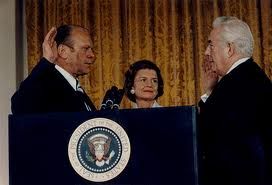Cross posted from The Stars Hollow Gazette
The LIBOR scandal continues to rattle the banking industry revealing the fraud that has gone unchecked by regulators in the US and Europe. The latest scandal that is now rocking international banking involves billions of dollars that were laundered by the British bank, Standard Charter, for Iran:
Standard Chartered bank ran a rogue unit that schemed with Iran’s government to hide more than $250bn (£160bn) in illegal transactions for nearly a decade, according to a scathing report by New York regulators that may put intense pressure on the management of the UK-based bank.
According to the report filed by the New York state department of financial services (NYSDFS), when warned by a US colleague about dealings with Iran, a Standard Chartered executive caustically replied: “You f—ing Americans. Who are you to tell us, the rest of the world, that we’re not going to deal with Iranians.” [..]
The 27-page report claims that Standard Chartered bankers helped Iranian clients skirt US financial sanctions against their country for nearly a decade.
Benjamin Lawsky, superintendent of the NYSDFS, said a Standard Chartered subsidiary in New York had also sought to do business with other US-sanctioned countries, including Libya, Burma and Sudan.It is the latest blow to the reputation of the City, already criticised in Washington following the HSBC money-laundering debacle and JP Morgan’s multibillion-dollar trading losses at its London office. [..]
The New York regulator has provided emails between members of Standard Chartered staff. In one the head of the US operations warned, among others, the executive director of risk in London, that the dealings with Iran could cause “very serious or even catastrophic reputational damage” to the group.
The email, dated October 2006, warned: “There is equally importantly potential of risk of subjecting management in US and London (e.g. you and I) and elsewhere to personal reputational damages and/or serious criminal liability.” It was this memo that provoked the response about “you f—ing Americans”.
But it wasn’t the Treasury Department or the Federal Reserve that dropped the bomb with these charges, it was Benjamin Lawsky, the New York Superintendent of Financial Services. Yves Smith at naked capitalism asked yesterday, “where were the Feds?”
The lack of action by everyone ex the lowly New York banking supervisor is mighty troubling. The evidence presented in Lawsky’s filing is compelling; he clearly has not gone off half cocked. Why has he pressed forward and announced this on his own? The Treasury Department’s Office of Terrorism and Financial Intelligence has supposedly been all over terrorist finance; the consultants to that effort typically have very high level security clearances and top level access (one colleague who worked on this effort in the Paulson Treasury could get the former ECB chief Trichet on the phone). For them not to have pursued it anywhere as aggressively as a vastly less well resourced state banking regulator, particularly when Iran is now the designated Foreign Enemy #1, does not pass the smell test.
At a minimum, this lack of sufficient inquisitiveness on behalf of the Feds would the bank snookered them by being terribly forthcoming (as in it was responding only to specific inquiries, and then as narrowly as possible). But it raises the more troubling specter that Federal regulators (oh, and the US Department of Justice) wanted to keep this all quiet so as not to lead to embarrassing headlines. Although there is nothing in the filing to point to failure to act by the New York Fed, which was presumably the lead party in the 2003 sanctions against SCB (indeed, it says specifically that SCB deceived Federal regulators), the flip side is there would be only downside to Lawsky in doing anything that would make Fed or Treasury think he was trying to make then look bad.
There was a huge furor in the UK over who among the banking regulators knew what when on the Libor scandal. If our Congresscritters are at all worth their salt, they ought to be putting Geithner and the relevant folks at the New York Fed under the hot lights. We’ll see soon enough how the Fed and Treasury play this. If they don’t launch parallel actions pronto, it will be a damning sign as to where they think their, and perhaps most importantly, Geithner’s, interests lie.
At emptywheel, Mary Wheeler, wondered as well why the Superintendent of Financial Services is policing our Iran sanctions?
Normally, we’d see accusations like SFS released today from Treasury’s OFAC (Office of Terrorism and Financial Intelligence), perhaps (for charges as scandalous as these) in conjunction with the NY DA and/or a US Attorney. And yet OFAC has had these materials in hand for 2 years, and has done nothing.
In fact, we have a pretty good idea what OFAC’s action would look like, because earlier this year it sanctioned ING for actions that were similar in type, albeit larger in number (20,000 versus 60,000) and far larger in dollar amount ($1.6 billion involving Cuba versus $250 billion involving Iran). Both banks were doctoring fields in SWIFT forms to hide the source or destination of their transfers. [..]
My wildarsed guess, in this case, is that we have an understanding with our allies that they’ll allow us to require the rest of the world to comply with our sanctions so long as it doesn’t affect that country’s businesses. That is, I suspect countries like Britain are happy to comply with our sanctions so long as British banks don’t lose competitive advantages as a result. Of course, these sanctions are different that-say-our stupid Cuba sanctions in that the UK is as enthusiastic about sanctioning Iran into docility as the US is, and this scheme is all about retaining lucrative business with Iran.
But we may never learn what reason that is, because that would make things uncomfortable for the entities that claim there is rule of law for banks while they ensure that usually is not the case.
But no matter, the Feds are now upset with Lawsky who had the cajones to do what they were obviously trying to cover up. Barry Ritholtz at Economonitor points out that Lawsky has virtually declared the Treasury and Federal reserve as “too corrupt” to handle this:
“Pursuant to the statutory powers vested in him by the People of the State of New York . . . [and] extensive investigation included the review of more than 30,000 pages of documents, including internal SCB (Standard Chartered Bank) e-mails that describe willful and egregious violations of law.
For almost ten years, SCB schemed with the Government of Iran and hid from regulators roughly 60,000 secret transactions, involving at least $250 billion, and reaping SCB hundreds of millions of dollars in fees. SCB’s actions left the U.S. financial system vulnerable to terrorists, weapons dealers, drug kingpins and corrupt regimes, and deprived law enforcement investigators of crucial information used to track all manner of criminal activity.
–NYS Department of Financial Services
Benjamin Lawsky, head of the New York State Department of Financial Services, has declared that the Treasury Department and the Federal Reserve is “too corrupt” to be involved in NY’s actions against money launderers and Iran sponsors at Standard Chartered bank.
At least, that corruption is what was implied by his actions (note those are my words, not his). Lawsky refused to give Tim Geithner or Ben Bernanke or anyone else at Treasury or the Fed any advance notice of pending legal/regulatory actions. Sorry, Treasury, he seemed to be saying, but your track records preceded you. [..]
This Treasury Department, like the one that preceded it, along with Congress and the White House, have proven themselves to be utterly incapable of overseeing the banking industry. Rather than adhere to this betrayal of the public trust, Mr. Lawsky decided to do something amazing: He actually followed the law. The rest of the regulatory sector should take note.
Have a read of the paragraph at the top of this page to see how prosecution of banking felons and their crony capitalist allies is supposed to be done.
We live in the Banana Republic formerly known as the United States. Its time to turn this nation back into a Democracy . . .
Let’s hope that Mr. Lawsky doesn’t cave to pressure like NY State Attorney General Eric Scneiderman did.

 Welcome to the
Welcome to the 

